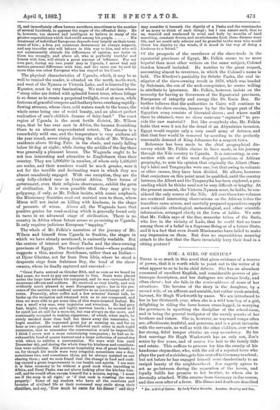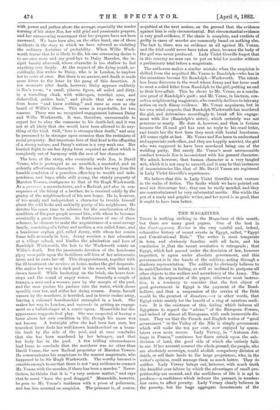ZOE : A GIRL OF GENIUS.*
THERE is so much in this novel that gives evidence of a. reserve of power, that it is worth while to point out to the writer of it what appear to us to be its chief defects. She has an abundant command of excellent English, and considerable powers of pic- turesque description, and her dialogues are always lively, and often clever ; but she fails in the vraisemblance of some of her situations. The heroine of the story is the daughter, by a second wife, of an affluent and amiable, but rather weak-minded, baronet, Sir Hugh Warkworth by name. We are introduced to her in her thirteenth year, when she is a wild tom-boy of a girl, delighting in riding the farm-horses cross-legged, in worrying the governess, in upsetting the discipline of the school-room, and in being the general instigator of the unruly pranks of her brothers and sisters. She is, however, as wayward romps often are, affectionate, truthful, and generous, and is a great favourite with the servants, as well as with the other children, over whom her strong, fitful temper obtains an easy ascendency. By his first marriage Sir Hugh Warkworth has an only son, Zoo's senior by five years, and of course the heir to the family title and estate. This suffices to procure for him the enmity of his handsome stepmother, who, with the aid of a rejected lover who plays the part of a cicisbeo, gets him sent off to Germany to school ; but not before he has engaged himself semi-clandestinely to an insipid beauty of the neighbourhood. Zoe eagerly agrees to act as go-between during the separation of the lovers, and loyally fulfils her promise to her brother, to whom she is devotedly attached.- Willie returns from Germany in due course, and dies soon after of a fever. His illness and death are described • Zoe: a Girl of Genius, By Lady Violet Hreville. London : Bootle/ and Son.
with power and pathos above the average, especially the tender nursing of his sister Zoe, her wild grief and passionate prayers, and her unreasoning resentment that her prayers have not been answered. We have here also, on the other hand, one of those incidents in the story to which we have referred as violating the ordinary doctrines of probability. When Willie Wark- worth learns that he is likely to die, his one consuming desire is to see once more and say good-bye to Daisy Marsden, the in- sipid beauty aforesaid, whose character is too shallow to feel anything very deeply. At the request of the dying youth, ac- cordingly, Zoe writes to Daisy, who is in London, to implore her to come at once. But there is no answer, and death is made more bitter to the lover by the pang of this desertion. A few moments after death, however, Daisy appears suddenly in Zoe's room, "a small, piteous figure, all soiled and dirty, in a travelling cloak, with wide-open, terrified eyes, and dishevelled, golden hair," and pleads that she was away from home "and knew nothing," and came as soon as she heard of Willie's illness. This scene is improbable, for two reasons. There was no recognised engagement between Daisy and Willie Warkworth. It was, therefore, unreasonable to expect her to obey the summons to his death-bed, and it was not at all .likely that she would have been allowed to do any- thing of the kind. Still, " love is stronger than death," and may be presumed to be stronger upon occasion than the restraints of social propriety. But imperious love of that kind is the offspring of a strong nature, and Daisy's nature is a very weak one. Her hurried flight to see her dying lover required an effort which is completely out of harmony with the rest of her character.
The hero of the story, who eventually weds Zoe, is David Venne, who is portrayed as an unselfish, a masterful, and an ardently affectionate character. He has made his way from the humble condition of a penniless office-boy to wealth and inde- pendence, and buys, while still young, the stately property of Marston Towers, contiguous to that of Sir Hugh Warkworth. As a parvenu, a manufacturer, and a Radical, and also in con- sequence of the felony of a brother, he is received coldly by the gentry of the neighbourhood of his new home. He is, however, of too manly and independent a character to trouble himself about the cold looks and unkindly gossip of his neighbours. He devotes his spare time to schemes for the amelioration of the condition of the poor people around him, with whom he becomes eventually a great favourite. In furtherance of one of these schemes, he chances to make the acquaintance of a semi-savage family, consisting of a father and mother, a son called Isaac, and a handsome orphan girl, called Jenny, with whom her cousin Isaac falls morosely in love. Jenny receives a fair education at a village school, and kindles the admiration and love of Randolph Warkworth, the heir to the Warkworth estate on Willie's death. But the passionate devotion of the handsome gipsy soon palls upon the fastidious self-love of her aristocratic lover, and he casts her off. This disappointment, together with the ill-treatment she receives at home, makes the girl desperate. She makes her way to a dark pool in the wood, with intent to drown herself. While hesitating on the brink, she hears foot- steps and the sound of angry voices. Presently a couple of tramps, a man and a woman, pass by the margin of the pool, and the man pushes his partner into the water, which closes speedily over her, and stifles her dying scream. Jenny, herself unseen by the murderer, is horrified, and in terror rushes away, leaving a coloured handkerchief entangled in a bush. She makes her way to London, and succeeds in getting an engage- ment as a ballad-singer at a comic opera. Meanwhile her dis- appearance suggests foul play. She was suspected of having a lover above her own condition in life, though his name was not known. A fortnight after she had been last seen, her truculent lover finds her well-known handkerchief on a bram- ble bush by the side of the pool, and at once concludes that she has been murdered by her betrayer, and that her body lies in the pool. A few trifling circumstances lead Isaac to conclude that the murderer was no other than David Venue, the new Radical proprietor of Marston Towers. He communicates his suspicions to the nearest magistrate, who happened to be Sir Hugh Warkworth. The worthy baronet is sensible enough to see that there is not "any evidence to connect Mr. Venue with the murder, if there has been a murder." Never- theless, he thinks that it is "a very serious matter," and says that he must "have the pool dragged:' Meanwhile, however, he goes to Mr. Venue's residence with a posse of policemen, and has him arrested on suspicion. The prisoner is, of course,
acquitted at the next assizes, on the ground that the evidence against him is only circumstantial. But circumstantial evidence is very good evidence, if the chain is complete, and verdicts of guilty in cases of murder are commonly based on nothing else. The fact is, there was no evidence at all against Mr. Venue, and the trial could never have taken place, because the body of the girl was never produced. Lady Violet Greville forgot that in this country no man can be put on trial for murder without a preliminary trial before a magistrate.
The authoress makes a similar mistake when the suspicion is shifted from the acquitted Mr. Venue to Randolph—who has in the meantime become Sir Randolph—Warkworth. The relent- less Isaac discovers in the wood where Jenny and her lover used to meet a soiled letter from Randolph to the girl, putting an end to their love-affair. This he shows to Mr. Venne, as a conclu- sive proof of Randolph's guilt; and Mr. Venue, in his turn, con- sults a neighbouring magistrate, who sensibly declines to take any action on such flimsy evidence. Mr. Venne acquiesces, but in his own mind suspects that Randolph Warkworth has murdered the girl, and determines accordingly to break off his engage- ment with Zoe (Randolph's sister), which certainly was not generous or manly. He -does it, however, and then is furious because the ill-used girl has sent no reply to his cruel letter, and treats her the first time they meet with brutal harshness. All comes right at last. Mr. Venne and Zoe learn to understand and appreciate each other, and they are happily married, the girl who was supposed to have been murdered being one of the wedding party. But surely Mr. Venire's most unreasonable conduct towards Zoe is inconsistent with his general character. We admit, however, that human character is a very tangled web, which it is not easy to unravel, and it may be that instances of inconsistencies like. that of Mr. David Venne are registered in Lady Violet Greville's experiences.
We believe that this is Lady Violet Greville's first venture in the realm of fiction. The faults which we have pointed out need not discourage her ; they can be easily mended, and they are counterbalanced by very substantial merits. She wields the pen of a ready and graphic writer, and her novel is so good, that it ought to have been better.



































 Previous page
Previous page